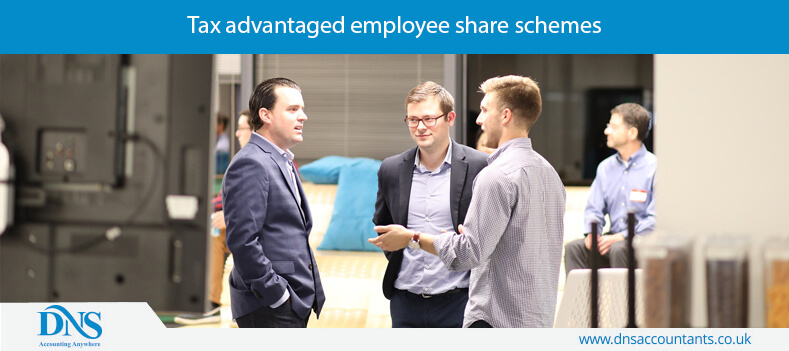Shares are often offered by the employers to their employees to motivate and retain them in the organisation. There are various factors and pitfalls which an employer needs to consider before offering shares to their employees. Share entitlement may be given based on performance or criteria mentioned in the company share policies.
Now, the question arises how an employee can benefit with these tax advantaged employee share schemes? There are many schemes offered by the employer to encourage employees and to give them opportunity to take stake in theorganisation. Some are government registered schemes that are highly tax efficient whereas other schemes are unapproved and are less tax efficient. HMRC approved tax advantaged employee share schemes are known as Government registered schemes. There are various tax advantages an employee can avail from these registered employee share schemes such as free from paying income tax and national insurance contribution on shares value.

- Tax implications on issue of shares
- Employee share schemes
- a) Share incentive plans (SIP’s)
- b) Save as you earn (SAYE)
- c) Company share option plan (CSOP)
- d) Enterprise management incentive
Tax Implications on Issue of Shares
Generally, the employees will be either given:
- Shares in the company or
- an option to purchase the shares at a future date.
When shares are given to employees, they will be subject to taxable employment income unless the employee pays the market value of the shares on the date of acquisition.
For example, let’s consider John a sales director who has been an employee of X Ltd for 4 years. In order to motivate him, the management gives him an opportunity to buy 1000 ordinary shares in the company. The current market value of the shares of X Ltd is £10 per share and John pays £3 per share to acquire the shares.
As, John has paid less than the market value the difference between the actual market value on acquisition and the price paid by John will be subject to employment income. Therefore, John has received a taxable benefit of £7,000 ((£10-£3)*1000 shares). If the shares are readily convertible assets (RCA), then the £7,000 will be subject to PAYE and both income tax and National Insurance Contributions (NICs) will be due. If the shares are not RCA, John will need to declare this in his self-assessment and pay income tax on it, no NIC will be due.
On the other hand, when an employer company grants a share option to an employee, the employee receives a right to acquire shares in the company, usually within a specified time frame.
It is important to note that there is no tax or NIC due when the option is granted to the employee. The tax implications will only arise when the option is exercised by the employee as this the point when the employee will actually acquire the shares.
Also See: Preference Shares vs Other Types of Shares
Whenever an employer offers company shares, an employee must be aware of the following factors before taking shares from the employer -
- What tax implications will arise on the acquisition of the shares?
- Whether the shares are offered under the 4 tax advantaged employee share schemes or not?
- If yes, under which scheme they are offered?
- What tax benefits are available under the scheme
Also See: Taxes on Stocks and Shares in UK
Employee Share Schemes
Employees can be offered unapproved share schemes which tend to be less tax efficient and do not provide the same tax advantages.Maximum tax advantages can be availed if the shares are offered through any of the following four HMRC approved schemes
- Share incentive plans (SIPs)
- Save as you earn (SAYE) – Savings related share option scheme
- Company share option plan (CSOPs)
- Enterprise management incentive
1) Share incentive Plans(SIPs)
Share incentive plan were introduced in 2000 to encourage employees and to provide them with the opportunity of taking stake in their own organisation. When a company operates a SIP, eligible employees of the company are entitled to participate in this scheme.
Under this scheme, initially an employee can receive “Free Shares” with no income tax or NIC consequences and if they keep it for 5 years,they don’t have to pay any income tax and national insurance contribution on the value of shares. It’s a highly tax efficient scheme for employees. Employees don’t have to pay capital gains tax on shares in case they keep the shares under this plan until they sell them.
If they take the shares out of the plan and sell them later after increase in their value, they may have to pay capital gains tax (CGT) on the amount of earned gain. There are 4 types of awards employees can get under SIPS –
- Free shares – Under the category of free shares, an employer is entitled to provide up to £3,600 of free shares in a tax year. No income and NIC’S to be paid on free shares.
- Partnership shares – Partnership shares are the shares which employee can buy from their salary before tax deductions. They can only spend £1,800 or 10% of their income (whichever is lower) in any tax year.
- Matching shares – Matching shares are the shares offered by the employer to employees when they buy partnership shares. An employer can give up to maximum of 2 free matching shares on every partnership share bought by an employee. No income and NIC’s to be paid on the matching shares.
- Dividend shares – Employees may be entitled to buy more shares from the dividend they earned from free, partnership or matching shares but it is only possible when employer’s scheme allows them to do so. There is no need to pay income tax in case they keep the dividend shares with them for at least 3 years.
SIPs need to be registered with HMRC and employers need to certify they satisfy the condition of the scheme. Normally, SIPs are operated by companies listed on the stock exchange called ‘quoted companies. One of the main disadvantages of SIPs is that usually all of the employees of the company must be invited to participate in the Scheme and the employees must be offered shares on similar terms. Also, the employer cannot provide favourable treatment to certain employees, which makes them inefficient if the employer wishes to issue shares based on performance.
2) Save as you earn (SAYE)
Save as you earn (SAYE) is a scheme introduced in 1980 under which employee is eligible to buy shares at a fixed price with their savings for a specific period. This scheme has been introduced to encourage personal investments and direct personal involvement in stocks and shares.
As per this scheme, an employee can save up to £500 monthly and can use this savings amount for buying shares at the end of the savings contract (3 or 5 years).
There are certain tax advantages of save as you earn scheme (SAYE) which are as follows:
- Tax free interest and bonus at the end of the scheme.
- No income tax or national insurance contribution to be paid on the difference between the amount you pay at the time of buying shares and what they actually cost.
Selling of shares
In case employee sell shares under save as you earn scheme (SAYE), they may need to pay capital gains tax. There is no need to pay capital gains tax in case they put shares into
- An individual savings account within 90 days of buying.
- A pension account immediately after buying.
SAYE schemes are available to companies listed on stock exchange or subsidiaries of company quoted on stock exchange and participation in the scheme must be open at any time to any employee/full time director at all times during a qualifying period.
Also See: How to Buy Shares UK: Trading, Investment and Stock Market
3) Company Share Option Plan (CSOP)
Company share option plan is a discretionary scheme launched in 1996 which can be set up by any independent company to provide benefits to their all or selected number of employees. This scheme is generally for the senior staff or selected number of employees.
Under the scheme, the employer grants an option to an employee giving the employee the option or the right to buy shares in the company at a fixed price within a specified period of time. The price at which the employee can buy the shares must not be less than the market value of those shares at the time the option is granted, so no discount can be given.
There is no income tax or NIC charge when a CSOP is granted. Generally, there is no tax or NI charge if the option is exercised between 3 and 10 years from the date the option is granted, irrespective of the market value on the date of exercise. So, no income tax or national insurance contribution to be paid on the difference between the amount employee pays at the time of buying shares and what they actually cost.
As per this scheme, employees can be given an opportunity to buy shares up to £30,000 at a fixed price.
For the company to operate CSOP:
- The scheme must be registered with HMRC.
- Shares offered should be ordinary shares.
- Shares should normally be listed on stock exchange or if unlisted, the company should not be controlled by another company.
The main benefit of CSOP is that unlike SAYE or SIPs, the company can invite selected full-time directors and full-time or part time employees to participate in the plan.
Since, the maximum value of shares that can be given to employee cannot exceed £30,000, the CSOPs cannot be used where the employer wants to offer more shares to employees.
Note – In case employee sells the shares under the company share option plan (CSOP), they may need to pay capitals gains tax on the increase in value.
4) Enterprise management incentives (EMIs)
EMI scheme is a very popular scheme among start-ups and established small and medium enterprises. It offers good tax advantages to both employers and employees. It is a discretionary scheme like CSOP in which qualifying companies grant options to the selected or key employees to acquire shares at an agreed price in the company in the future. In this scheme, employee will be benefit when the share value increases between the date the option is granted and the date the option is exercised i.e. when the employee acquires the shares.
Similar to CSOP, there is no charge to income Tax or NI when the option is granted. Unlike CSOP, EMIs can be offered at a discount. Employees don’t have to pay income tax or national insurance contribution; in case they buy the shares for at least the market value on the date when the option was granted to them and the option is exercised within 10 years.
In case employees were offered the option to purchase the shares at a discount or they bought the shares at less than the market value on the date option was granted, they will need to pay income tax and national insurance contribution (assuming the shares are RCA, which is highly unlikely for EMI companies) on the difference between the amount they pay at the time of buying shares and what they actually cost.
A company is eligible to offer enterprise management incentives only, if it holds assets of £30 million or less. The company can grant employees up to £250,000 of share options in a 3 year period.
EMIs are therefore more advantageous for the employees and also for employers who wish to reward employees.
Note – In case employee sell the shares under enterprise management incentive plan, they may need to pay capital gains tax on the increase in value but will benefit from the asset disposal relief provided the qualifying conditions are met.
We have written a more detailed article on EMI, which can be found here: Enterprise Management Incentives (EMIs) Scheme
DNS Accountants has been advising companies for a number of years on employee share schemes. Our employee share scheme services include;
- Advising on the best scheme type for your business.
- Drafting of scheme documentation.
- Drafting employee guides and helping you communicate this to employees.
- Valuation of the employee shares.
- Compliance with HMRC and Companies House.
- Accounting advice
In case you want more information or advice on employee share schemes, kindly call us on 03330886686 or you can also e-mail us at enquiry@dnsaccountants.co.uk.
Also See:
Entrepreneurs Relief When Selling Shares
Gifting shares to employees and HMRC valuation
Any questions? Schedule a call with one of our experts.








